Idiom Worksheets & Tests
Students are often required to identify idioms on state tests, but what are idioms? It's hard to define them. This is because idioms are made from other figurative language techniques (like simile, metaphor, or hyperbole).
Idioms are different from other figurative language instances because people use idioms A LOT. Idioms are cliched figurative expressions. They have become part of the language as it is used. They are so common that many native speakers are unaware that they are using figurative language. Let's look at an example:
This figurative expressions is a metaphor. It compares the subject to a steam engine. But it's also an idiom. That's because the metaphor comparing steam to a person's energy is so common that it has become idiomatic. Native speakers don't have to bother to decode the metaphor. They know instantly what it means. Steam has become an idiomatic metaphor.
Many idioms are dated expressions. They may refer to technology that is less utilized today, like steam. This can make idioms challenging for young students to understand. Most of today's students do not understand the origins of the phrase "hang up the phone" yet alone the idiom "bought the farm." It is good to expose students to a wide range of idioms. This page contains tests, worksheets, and interactive activities to help your students master idioms.
Idiom Tests
Here are some idiom tests. Each test has 15 questions. Each question has a bolded idiom in a context-rich sentence. Students choose the best definition for each.
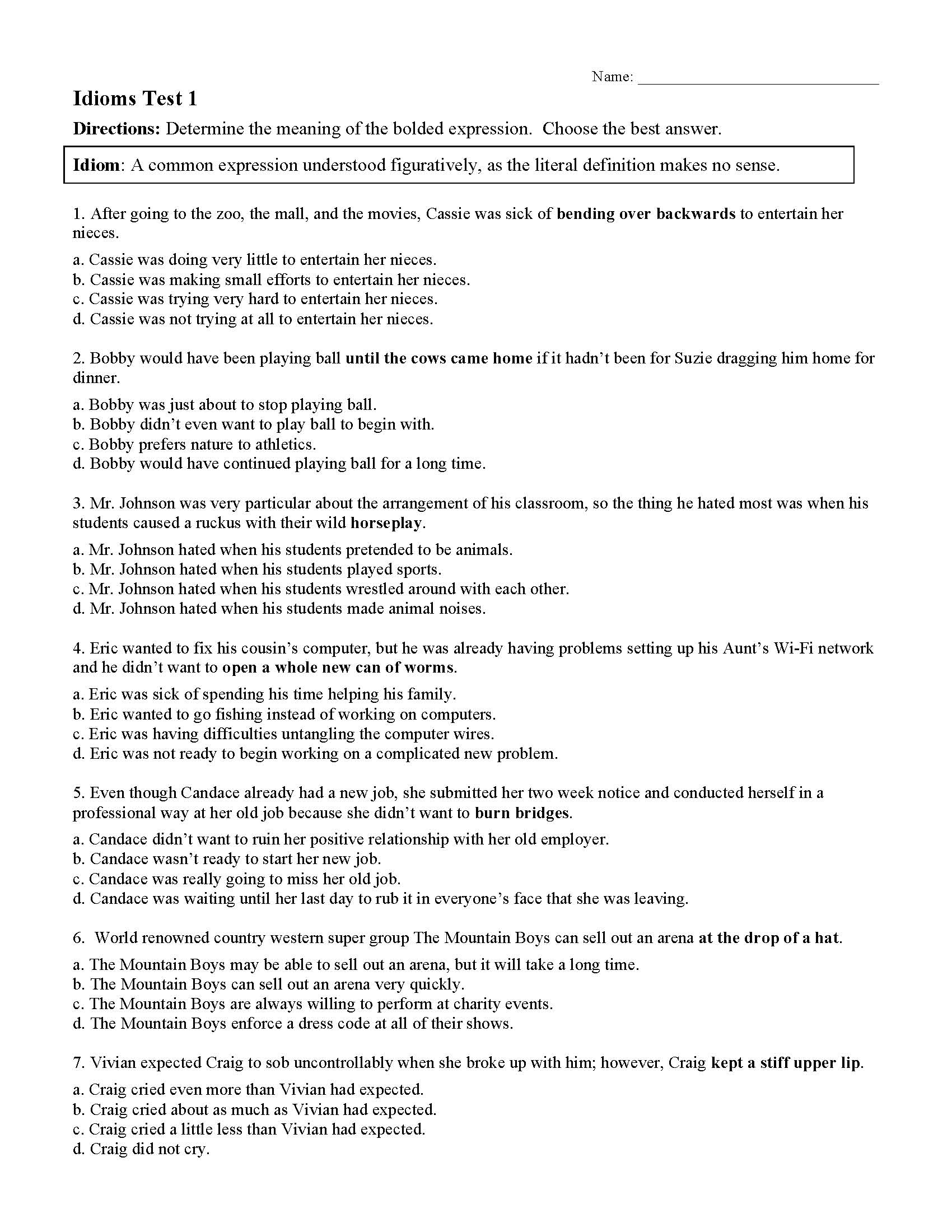
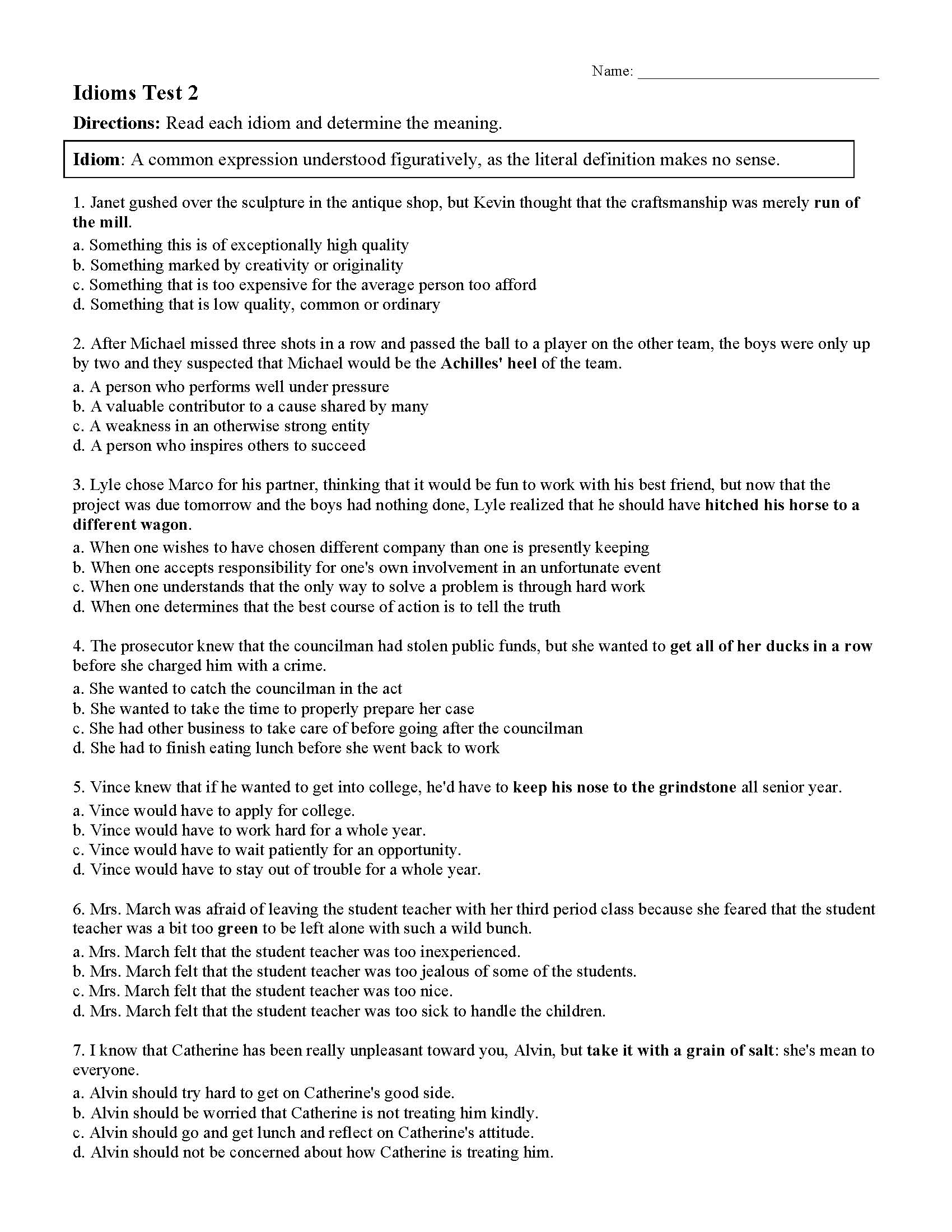
Idiom Worksheets
Here are some idiom worksheets. The paper and printable versions of these worksheets are more open-ended than the idiom tests (above), which are multiple-choice. The online versions of these worksheets are pretty much the same.
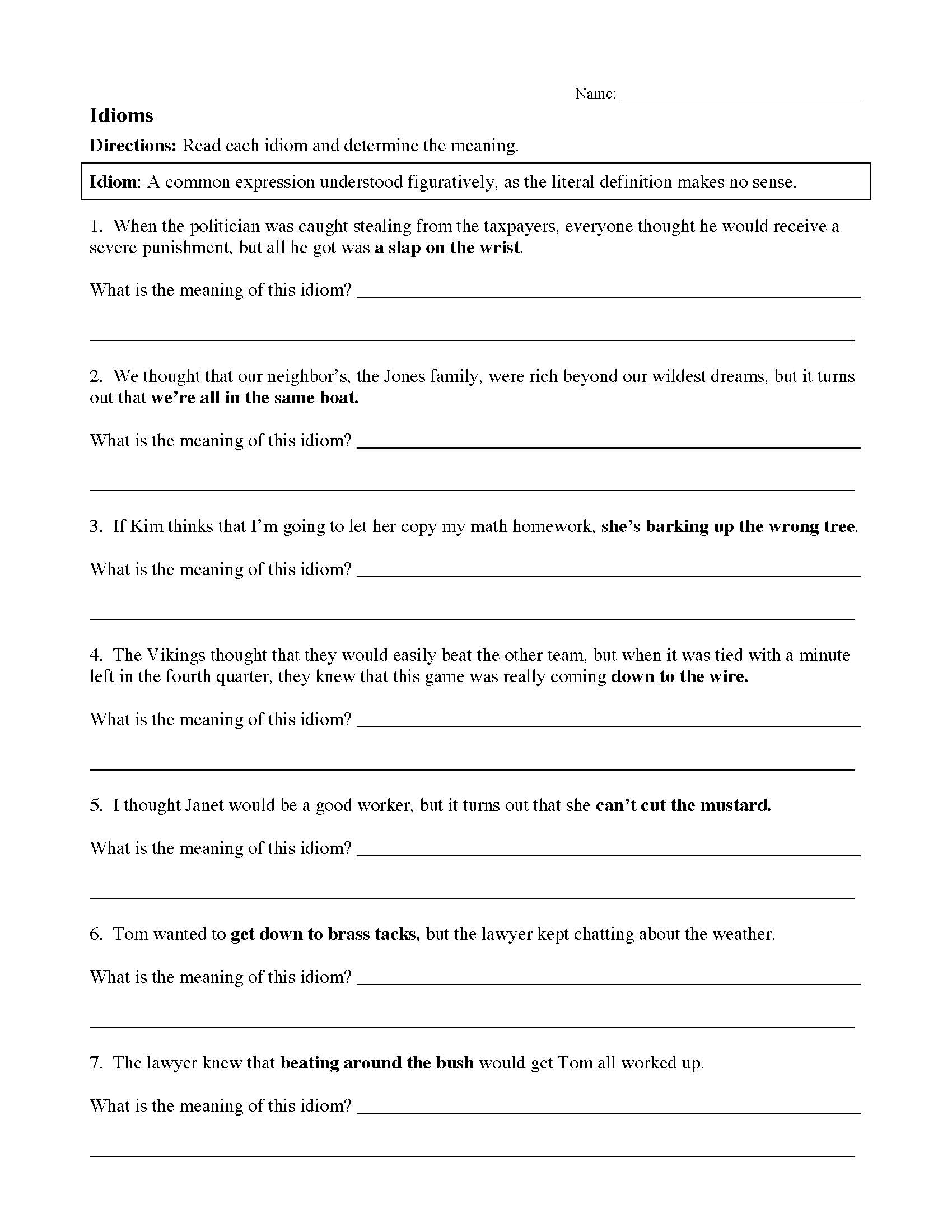
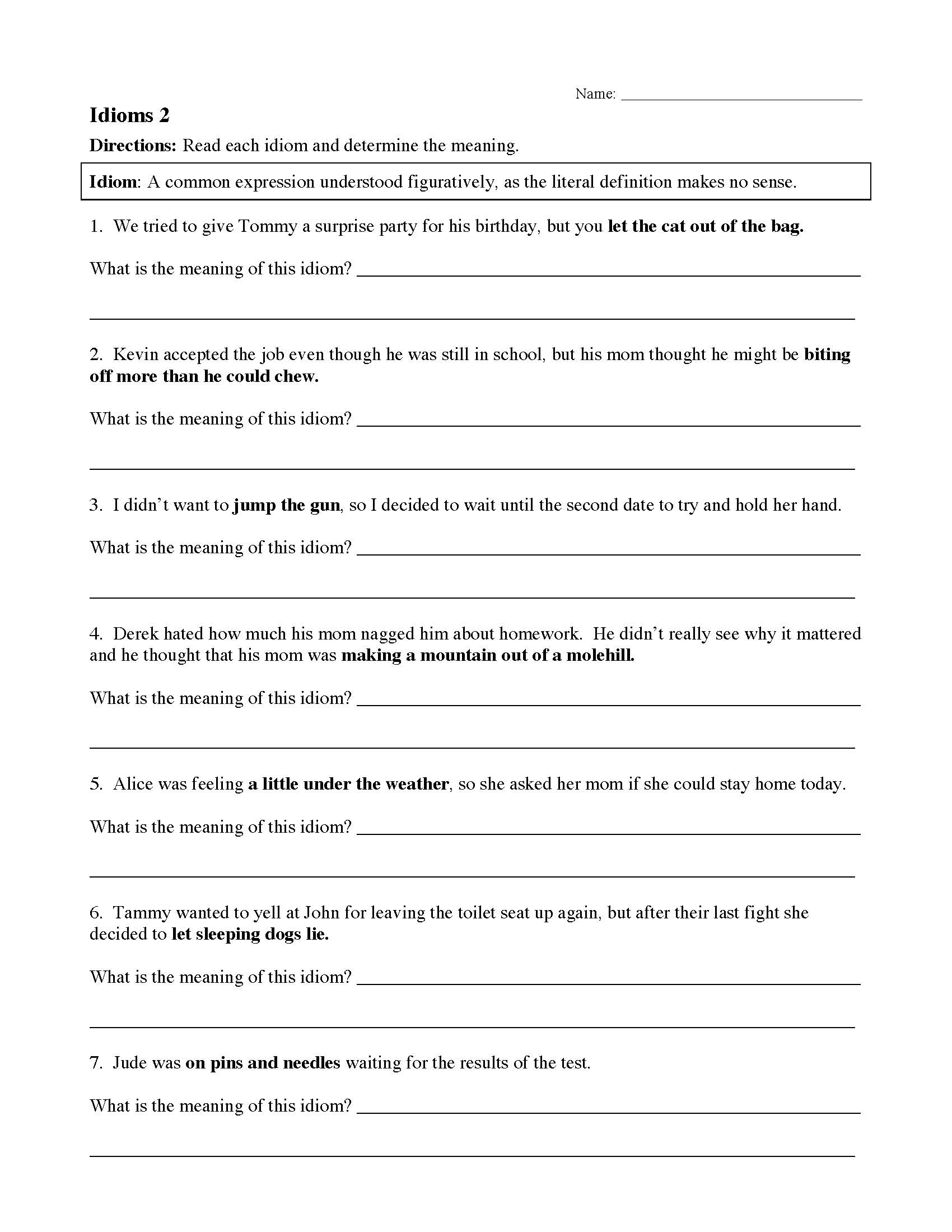
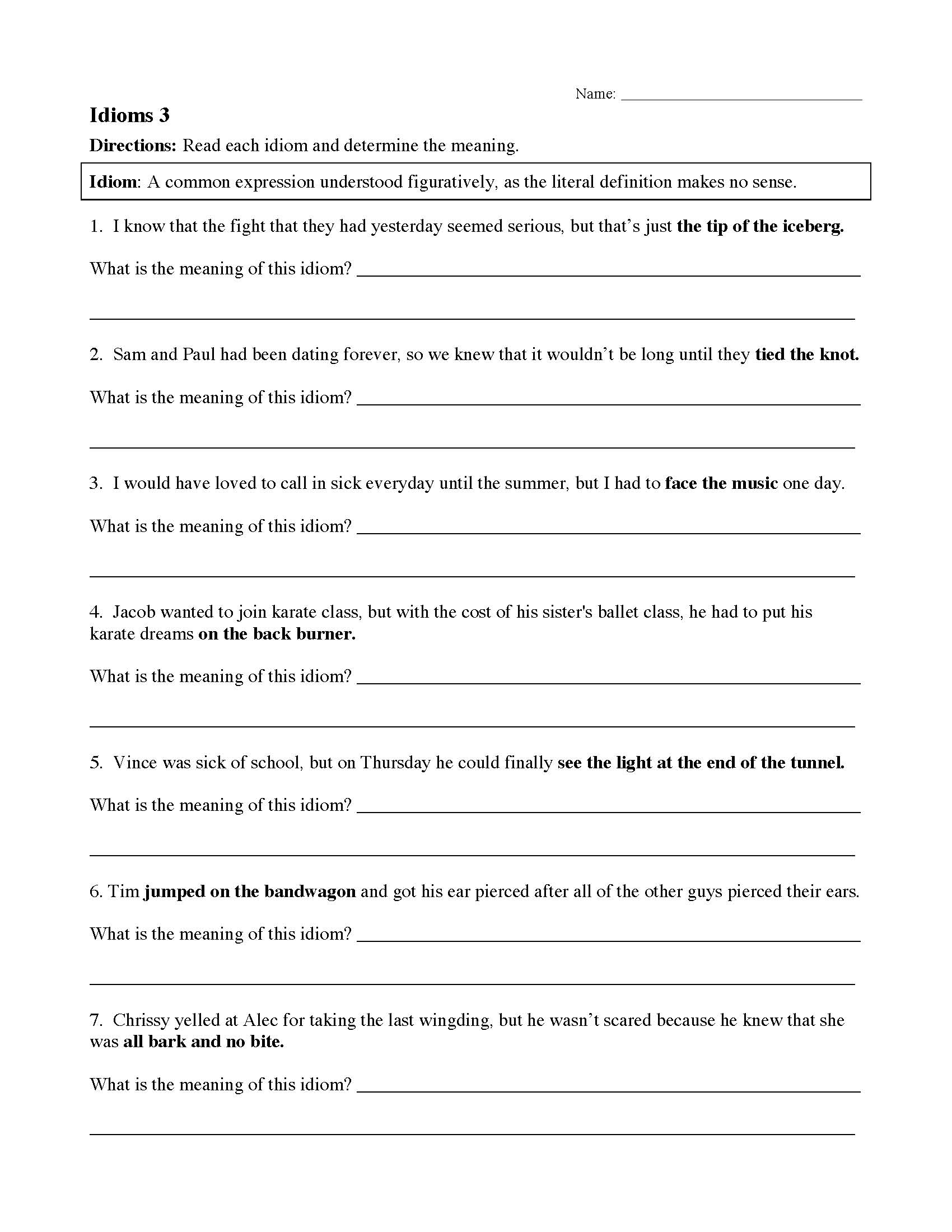
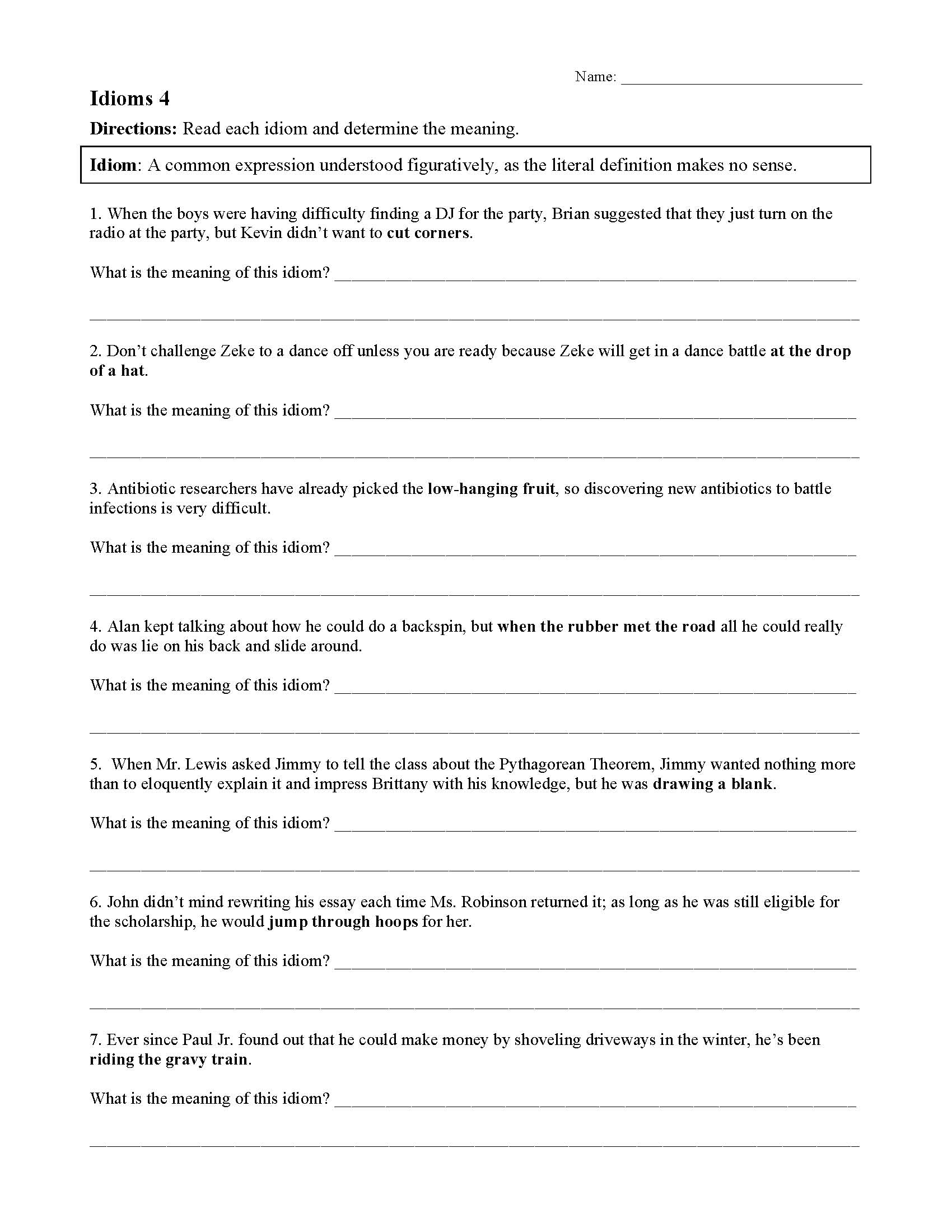
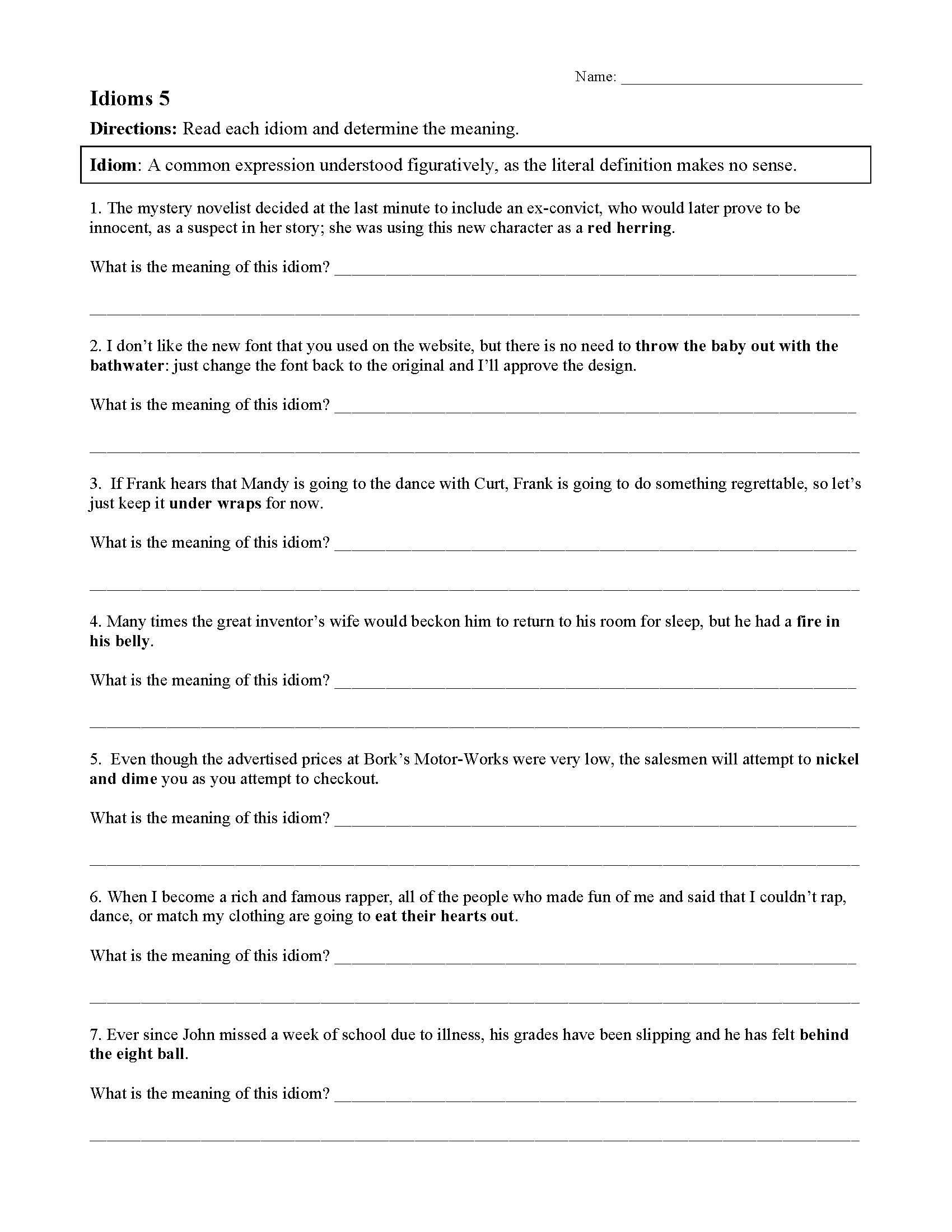
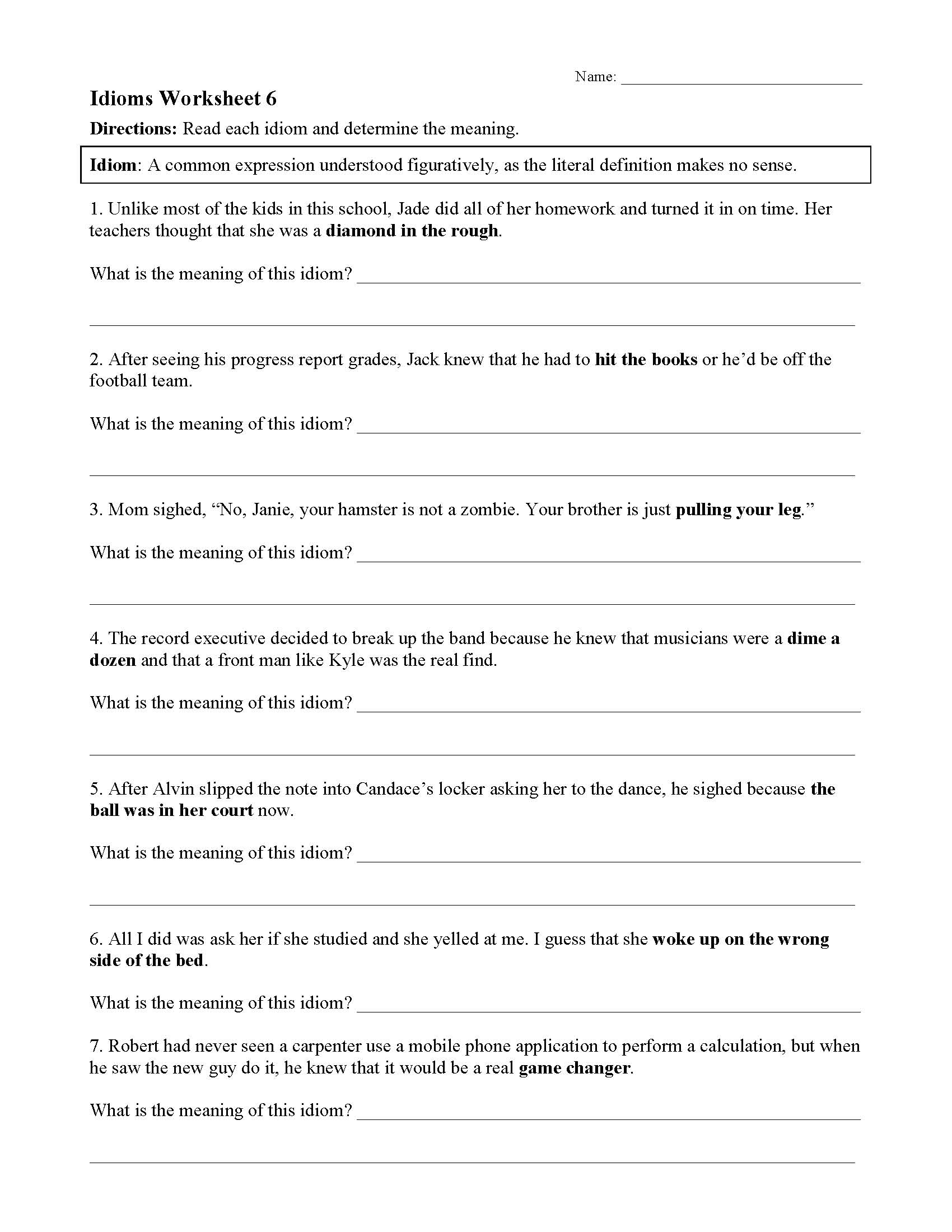
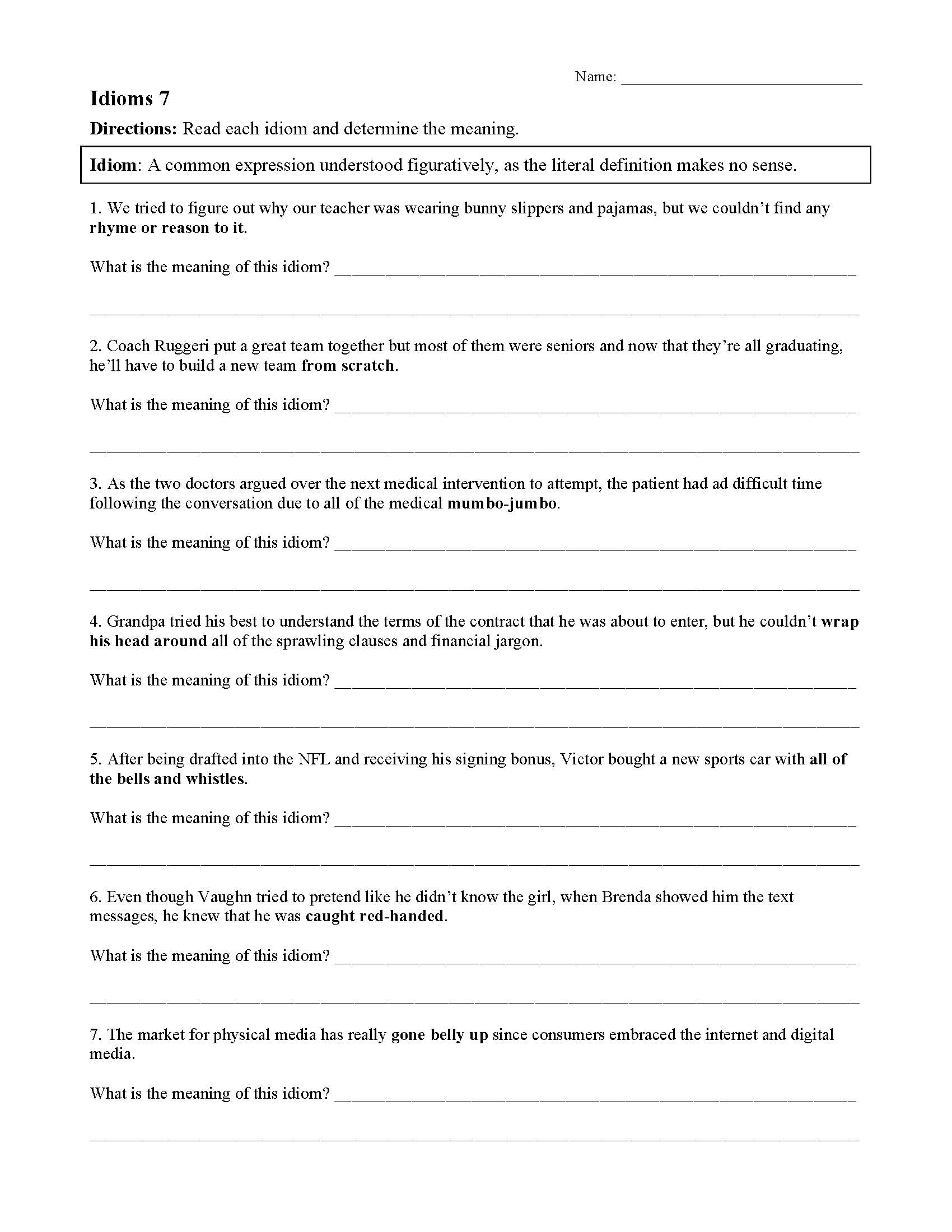

Idioms
Common Core State Standards
RL.2.4 - Describe how words and phrases (e.g., regular beats, alliteration, rhymes, repeated lines) supply rhythm and meaning in a story, poem, or song.
RL.3.4 - Determine the meaning of words and phrases as they are used in a text, distinguishing literal from nonliteral language.
RL.4.4 - Determine the meaning of words and phrases as they are used in a text, including those that allude to significant characters found in mythology (e.g., Herculean).
RL.5.4 - Determine the meaning of words and phrases as they are used in a text, including figurative language such as metaphors and similes.
RL.6.4 - Determine the meaning of words and phrases as they are used in a text, including figurative and connotative meanings; analyze the impact of a specific word choice on meaning and tone.
RL.7.4 - Determine the meaning of words and phrases as they are used in a text, including figurative and connotative meanings; analyze the impact of rhymes and other repetitions of sounds (e.g., alliteration) on a specific verse or stanza of a poem or section of a story or drama.
RL.8.4 - Determine the meaning of words and phrases as they are used in a text, including figurative and connotative meanings; analyze the impact of specific word choices on meaning and tone, including analogies or allusions to other texts.
RL.9-10.4 - Determine the meaning of words and phrases as they are used in the text, including figurative and connotative meanings; analyze the cumulative impact of specific word choices on meaning and tone (e.g., how the language evokes a sense of time and place; how it sets a formal or informal tone).
RL.11-12.4 - Determine the meaning of words and phrases as they are used in the text, including figurative and connotative meanings; analyze the impact of specific word choices on meaning and tone, including words with multiple meanings or language that is particularly fresh, engaging, or beautiful. (Include Shakespeare as well as other authors.)
L.3.5a - Distinguish the literal and nonliteral meanings of words and phrases in context (e.g., take steps).
L.4.5 - Demonstrate understanding of figurative language, word relationships, and nuances in word meanings.
L.4.5a - Explain the meaning of simple similes and metaphors (e.g., as pretty as a picture) in context.
L.5.5a - Interpret figurative language, including similes and metaphors, in context.
L.6.5 - Demonstrate understanding of figurative language, word relationships, and nuances in word meanings.
L.6.5a - Interpret figures of speech (e.g., personification) in context.
L.7.5 - Demonstrate understanding of figurative language, word relationships, and nuances in word meanings.
L.7.5a - Interpret figures of speech (e.g., literary, biblical, and mythological allusions) in context.
L.8.5 - Demonstrate understanding of figurative language, word relationships, and nuances in word meanings.
L.8.5a - Interpret figures of speech (e.g. verbal irony, puns) in context.
L.9-10.5 - Demonstrate understanding of figurative language, word relationships, and nuances in word meanings.
L.11-12.5 - Demonstrate understanding of figurative language, word relationships, and nuances in word meanings.
L.11-12.5a - Interpret figures of speech (e.g., hyperbole, paradox) in context and analyze their role in the text.

Search here.
79 Comments
Leave a Reply
- Author's Purpose Worksheets
- Characterization Worksheets
- Conflict Worksheets
- Fact and Opinion Worksheets
- Figurative Language Activities
- Figurative Language Poems with Questions
- Genre Activities
- Irony Worksheets
- Making Predictions
- Mood Worksheets
- Nonfiction Passages and Functional Texts
- Parts of Speech Worksheets
- Poetic Devices
- Point of View Worksheets
- School Project Ideas
- Setting Worksheets
- Simile and Metaphor Worksheets
- Story Structure Worksheets
- Text Structure Worksheets
- Theme Worksheets
- Tone Worksheets
- ALL PAGES AND WORKSHEETS




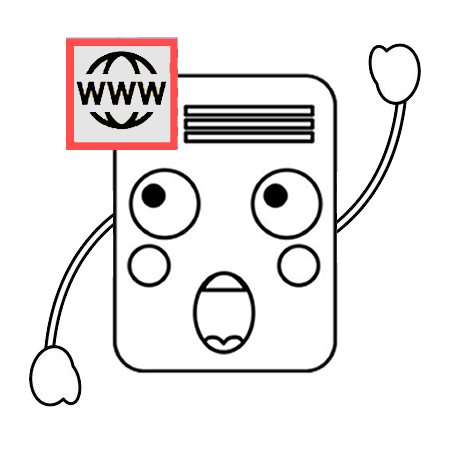


Diamond
/ October 4, 2017this is a helpful website for a student that is in need of help in school and ELA class -Mrs Diamond class in Greensboro
Chifuto
/ October 3, 2017This is my go-to site for most things English. Thank you.
Tinh Cao
/ July 25, 2017Thank you very very very much. Love!
mohsaid kissoum
/ March 23, 2017Thanmirth! That’s absobloodilootly a great job! I really enjoy what you are doing. MyThumb’s up!
Ana Martinez
/ March 12, 2017This site is AWESOME! Thanks for sharing for free! This makes my job easier! Kind regards from Mexico! 🙂
Zehra Suleman
/ November 15, 2016i think there should be some more exercises for more illustration
keertti mutreja
/ August 11, 2016Kudos to the Team…Amazing work !! Would be of Great help..Thank you
Nonette Romero
/ June 28, 2016This is the best website I’ve seen. More power to you and your team! May God bless you and your team a hundrefold!
Mr. Morton
/ June 29, 2016Thank you for the blessings.
BUJJI
/ June 10, 2016You saved my life with these exercises. Much appreciated. Thanks.
cassie
/ April 28, 2016very great website. really help me to gain my knowledge in terms of idiomatic expression!! THANK YOU SO MUCH FOR THIS SITE!!I SALUTE
cassie
/ April 28, 2016this is a nice website! really much help me in school
Mariesa
/ April 27, 2016Thank you so much. Fantastic worksheets that have helped me greatly and saved me a lot of time too!
Roxana Santee
/ March 20, 2016Excellent! great job, you just saved my life! Thank you so much!
DUAA LAKANI
/ February 10, 2016WOW! EXCELLENT
Deana
/ October 9, 2015I love this site. Do you think there is anyway you could add some expository writing activities?
Bonnie
/ August 25, 2015Great website!
In Idiom Test 1, I believe the correct answer for #5. is a, and #8 is c.
Mr. Morton
/ August 25, 2015Thanks! I’ve updated the answers.
jeril
/ September 16, 2016thanks for this website,Best website ever!
carlos
/ July 9, 2015You saved my life with these exercises. Much appreciated. Thanks.
Jim
/ July 2, 2015It’s just great that people are willing to share such valuable resources. Thank you indeed.
faresa
/ March 24, 2015Wow wonderful
Sarah
/ December 31, 2014Your entire website is an excellent resource for teachers! Thank you for sharing your work:)
Mr. Morton
/ January 5, 2015Thank you for visiting. I am working hard to improve it.
Nupur
/ October 26, 2014This website is amazing and very helpful!!thank you so much. I am sure i’m going to do better with the help of these worksheets! 🙂
Bhargavi
/ September 5, 2014I’m not a native speaker of English and these idioms are a great help for me to learn the language. I aim to learn one new idiom a day, but I just get caught up in these worksheets since they’re so much fun! Thank you for all your efforts!
Mr. Morton
/ September 10, 2014I’m so happy to hear it. Best wishes!
Teacher Barry
/ July 10, 2014Excellent resources. Just what the doctor ordered. Thank you.
Merlo
/ April 21, 2014thanks these are excellent worksheets helpful a lot.
ruby
/ March 26, 2014excellent
Kiera
/ December 5, 2013Are there answer sheets to all the worksheets?
Mr. Morton
/ July 10, 2014There are now.
Jennifer Kerr
/ November 19, 2013I was moved from middle school to high school this year and am starting over with curriculum! Thanks for all the great materials!!!!!!
Mr. Morton
/ November 20, 2013You’re going to do fantastic. Best wishes.
Denise Haydon
/ November 9, 2013Thanks so much for sharing these worksheets. I needed something that my 5th grade students could use to help them figure out idioms in reading context and these are perfect.
Mr. Morton
/ November 20, 2013I’m so happy to hear it. Best wishes!
Brenda
/ November 7, 2013It will be nice, if it had the answers as well !! 🙂
Yara
/ September 29, 2013Perfect!! thanks a lot. A great help
Bharathy Shree
/ April 22, 2013The worksheets are excellent and very apt for my grade level.Keep up the good work
Melinda Gamargo
/ January 10, 2013Wow. I loved these worksheets!! Lots of learning in one 2-sided sheet. Great for teaching idioms AND context clues. Bravo.
Gary
/ November 27, 2012I’ve bookmarked your site. You have my gratitude and admiration.
Cheers,
Gary
Mr. Morton
/ December 2, 2012Thank you, best wishes.
Sai Bun Kham
/ November 16, 2012What should I write while every one says your website is fantastic. I would say ” you can say that again”. As I am in a preparation of TOEFL test, it would nice if you can find some of the TOEFL materials and post it. Thanks for your hard-work. 🙂
Mr. Morton
/ December 2, 2012Hmm… perhaps once I learn what TOEFLS are. If they’re anything like waffles, I bet that they are delicious.
Michelle
/ October 12, 2012This website is great! It is so hard to find good handouts that are not too elementary for my high school students. I have passed this on to my colleagues. Everyone loves the idea that not only do you have printable worksheets, but also editable ones!
Minara
/ August 14, 2012Your website is fantastic. I use your materials to teach my little brother. I really appreciate your hard work. I love your website. I am looking for parallel structure/sentence worksheet. I noticed, writing is easier when they know how to write a correct parallel structure sentence. Can you please post some parallel structure worksheet or email it to me?
Thanks
Mr. Morton
/ August 30, 2012That’s awesome. I don’t have any such worksheet at this time, but thank you for the suggestion. I’d love to make such activities sometime in the future.
Tawfiq
/ August 5, 2012Such a fantastic website … All of your worksheets did a great help to me … It would be so nice if you could provide the answer key too… Anwz, thank you for all ..
Mr. Morton
/ August 30, 2012Yes, I’d like to. Perhaps soon. Thank you for visiting.
Ms. A
/ May 20, 2012Thank you very much for posting all of these worksheets! I just began teaching English and suddenly am being attacked from every angle with new assessments for skills that students should have learned ages ago. Not only are these sheets a great way to test them before the test, but they prevent having to prepare a full lesson to refresh their memories. Also, they follow the rules of all of the workshops I have been attending which tell us not to hold students’ hands when doing this work. Thank you Mr. Morton!
Mr. Morton
/ May 22, 2012Thanks for visiting!
joel machava
/ April 9, 2012thank you for the data you throw to us. i didnt have any opinion of a worksheet before and i thought it to be hard to find. now i am in a good position to design my own for my students. thank you very much. keep doing so!….
Mr. Morton
/ April 15, 2012I’m happy to hear it. Thanks for visiting!
beatrice
/ April 3, 2012Do you have the answers to your worksheet? they are great but I am somtimes uncertain of the answers.
Blue in Poland
/ March 15, 2012Thank you, I shall be trying these with a class later.
🙂
Mike
/ February 26, 2012I am an ESL teacher and these worksheets are great tools for my students. They are beginning to pick up the nuances of the English language and slang. Thanks!
Kathi
/ February 18, 2012Your website is amazing! This year I was assigned 7th grade English, which I haven’t taught for 10 years. A lot of things have changed since then, and your website has helped me tremendously! I have even told my high school English teacher about your website. THANKS SO MUCH!!!
Mr. Morton
/ February 23, 2012Wow, what a compliment! Thanks for visiting.
Ross
/ February 2, 2012Wow, I am very impressed with this website! There are so many useful worksheets! Thank you so much for your hard work!
Brook
/ January 23, 2012WOW! Great job on the worksheets. It was a nice surprise to foind something well done for classroom use…lots of useless garbage floating around out there.
Mr. Morton
/ January 31, 2012I concur. Check out some of my other stuff too!
Melissa
/ December 8, 2011Are there any answer keys for the idiom worksheets? I LOVE this site btw!!!
Tara
/ December 7, 2011Are there answer keys for the Idiom worksheets?
Mr. Morton
/ December 14, 2011Not currently, but I’d love to add some soon.
Gunn
/ November 28, 2011YEA……this went over well with my students, now we are working on different cultures idioms…..thanx
Mr. Morton
/ December 1, 2011Sounds interesting. Thanks for visiting!
Michelle Finn
/ September 5, 2011All of your worksheets are excellent. So far above the usual cookie cutter fare found on most educational websites. Thanks you so much for sharing your time, effort and obvious skill level with us all.
Mr. Morton
/ September 5, 2011You’re too kind, Mrs. Finn.
frank cannon
/ April 14, 2011Excellent!
The worksheets are a great help.
Just what I needed.
Thank you!
Mr. Morton
/ April 15, 2011Happy to hear it, Mr. Cannon. Thank you for taking the time to comment.